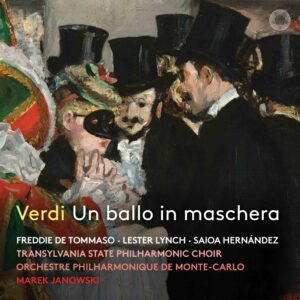
CD Review: Pentatone’s ‘Un Ballo in Maschera’
By Bob DieschburgThe forces behind the Dutch label Pentatone are deserving of every accolade for producing beautifully engineered recordings. This is especially important considering that heavy hitters like Warner and Sony only hesitatingly, and with big marketing efforts, venture into the operatic realm, knowing that its share of profitability has long become a calculated and somewhat unwanted risk. Critics will surely remember how EMI’s “Tristan und Isolde” from 2004 was widely hailed as the last studio production of its kind.
Pentatone is proving skeptics wrong, however, and with “Un Ballo in Maschera” has added yet another entry to its growing catalog of opera favorites.
After last year’s “La Traviata” and an earlier release of “Otello,” Pentatone’s third take on Verdi features a star-studded cast with, in the main roles, British-Italian tenor Freddie de Tommaso and Spanish soprano Saioa Hernández. Austrian contralto Elisabeth Kulman sings an impeccable Ulrica, while German soprano Annika Gerhards lends her voice to the trouser role of Oscar. Two veterans of the Pentatone roster equally participate in their new “Masked Ball”—American baritone Lester Lynch as Renato, and Polish-German conductor Marek Janowski at the helm of the Orchestre Philharmonique de Monte-Carlo.
A tenor on the rise
The casting of Covent Garden’s Freddie de Tommaso is the strong point of the current release, and his first appearance on CD since his somewhat uneven “Il Tenore” recital for Decca in 2022. Yet, in terms of the recording chronology, “Un Ballo in Maschera” seems to predate the Decca recital, as it unusually dates from two recording sessions in the summer and fall of 2021, the choir parts having been recorded during the latter session in Romania. Consequently, Pentatone’s “Ballo” also precedes de Tommaso’s Riccardo from the Verbier Festival in 2022 with, as his partners, French baritone Ludovic Tézier and America soprano Angela Meade.
This would have little bearing if, at least to who currently writes, de Tommaso’s singing in the Pentatone album was not infinitely superior to both “Il Tenore” and the performance in Verbier. The phrasing is much more nuanced, in line with the rhythmic flow of both the text and the music. De Tommaso does not deliver a vocal exhibition but a carefully modeled character portrayal, imbued with a wealth of timbral colors reminiscent, in the very best sense, of monstres sacrés such as Carlo Bergonzi under the batons of Georg Solti (1960/61) and Erich Leinsdorf (1966). In “Di’ tu se fedele,” for instance, his use of rubato is perfectly measured, the attack on the B-flat flawless, and the chest voice well integrated into the outpour of his beautifully spinto-heavy tone.
A sound Amelia
In Saioa Hernández, de Tommaso has a lushly voiced partner, secure in both “Ma dall’arido stelo” and “Morrò, ma prima in grazia.” Yet her Amelia does not unconditionally enthrall, as I do not find her especially memorable for either emotional abandon or congeniality to the music’s dramatic implications.
Yes, Hernández has a steely incisiveness to her middle and high registers that, when exposed, makes for impressive moments of acoustic thrill—such as the C on “o Signor” in “Ma dall’arido stelo”—yet there is little to be heard of the Toscaninian “lacrima” or tear in the voice. For instance, in “Morrò, ma prima in grazia,” Hernández conveys a mother’s wish to see her son in outline only and, to stay with the pictorial metaphors, does not paint Amelia’s anguish in nearly as many colors as others have.
Hernández is a very able Amelia; but not one I would prefer, in this role, over the all-time greats from the past.
Lynch’s best performance?
Lester Lynch, as Renato, gives one of his best performances on record so far. His vocal physiognomy is imposing, with plenty of heft and tonal evenness despite the lack of a typically Italian, or even Verdian, snarl.
In “Alla vita che t’arride” he demonstrates fine legato singing. In “Eri tu che macchiavi” I personally find the vengefulness of the character to be slightly amiss. He nevertheless remains in full command of the technical breadth of Verdi’s writing and stylistically he is much more at home in “Un Ballo in maschera,” with its musical vestiges of the Belcanto era, than in Pentatone’s “Cavalleria rusticana” and “La Fanciulla del West.”
As mentioned above, Elisabeth Kulman sings an alluring Ulrica, brooding in the velvety depths of her lower register, while Annika Gerhards makes for a charming Oscar. The parts of Samuel and Tom are luxuriously cast with American bass-baritones Kevin Short and Adam Lau, respectively.
Introducing “Un Ballo in Maschera”
All in all, the recent “Ballo” is a well balanced—though not unmitigated—success that in its component parts alternates moments of brilliance with stretches of somewhat pedestrian routine. In “Teco io sto,” for instance, I wished for the romantic tension to be more heated, the syntony between de Tommaso and Hernández to be even greater.
The same, to some extent, holds true for the conducting of Marek Janowski, who embarks on a finely nuanced take on Verdi’s notoriously colorful score. It strikes an appropriate balance between its various sources of inspiration, including the French opéra comique and Italy’s very own set of dramatic conventions. Conversely, Janowski’s “Ballo” sounds more tame and less idiosyncratic than earlier takes by some of his most distinguished peers. It is a well done introduction for newcomers; others, however, will likely resort to established favorites, such as the the Votto and Leinsdorf recordings with Leontyne Price and Callas as Amelia respectively.


